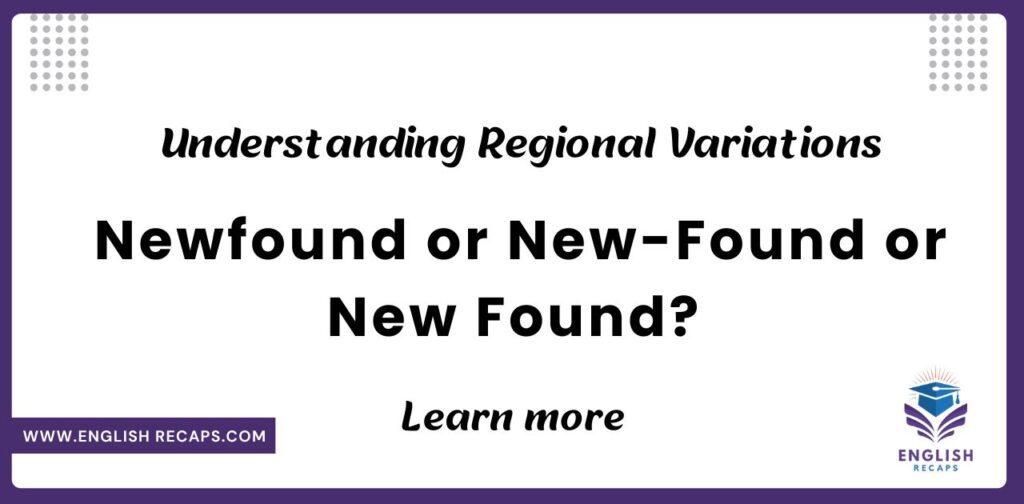Ever scratched your head over whether to write “newfound,” “new-found,” or “new found”? You’re not alone. This tricky word trips up even the best writers.
So, what’s the deal? In a nutshell:
- “Newfound” (one word) is most common in American English.
- “New-found” (hyphenated) is traditional in British English, but less so now.
- “New found” (two words) is generally incorrect as a compound adjective.
These variations all mean the same thing: recently discovered or experienced. But which one you use can depend on where you’re from or who you’re writing for.
Let’s dive into the fascinating world of regional language differences and unravel this linguistic mystery together.
The Newfound Dilemma: A Writer’s Headache
Picture this: You’re crafting an important email or putting the finishing touches on your novel. Suddenly, you pause. Should it be “newfound respect” or “new-found respect”? And wait, is “new found respect” even an option? This isn’t just about dotting i’s and crossing t’s. It’s about clarity, style, and yes, even where you’re from.
Exploring the Evolution of “Newfound”
Language is a living, breathing thing. It evolves, adapts, and sometimes confuses the heck out of us. Let’s take a journey through time and see how “newfound” came to be the word we know today.
The Origin and Historical Use of “Newfound”
Believe it or not, “newfound” has been around since the late 15th century. Back then, folks were just as excited about new discoveries as we are today. The term emerged between 1490 and 1500, combining “new” and “found” to describe something recently discovered or experienced.
Imagine a 15th-century explorer exclaiming, “I have a newfound appreciation for sturdy boots!” Okay, maybe they didn’t say exactly that, but you get the idea.
How Language Evolution Simplifies Spelling
Over time, English has shown a tendency to simplify. It’s like language goes to the gym and trims the fat. This trend towards simplification is why we often see compound words lose their hyphens and spaces.
Think about it: “To-day” became “today,” “to-morrow” turned into “tomorrow.” It’s not laziness; it’s efficiency. And “newfound” is riding this wave of linguistic streamlining.
Newfound in Contemporary Usage
Fast forward to today, and “newfound” is everywhere. From news headlines to bestselling novels, it’s the go-to term for describing recent realizations or discoveries.
You might read about an athlete’s “newfound confidence” after a big win or a tech company’s “newfound success” in the market. It’s a versatile word that packs a punch in just eight letters.
The Great Debate: Newfound vs New-Found
Now, let’s address the elephant in the room. Why do we sometimes see “new-found” with a hyphen? Is it correct, or is someone just being fancy?
Hyphenation and Its Role in English
Hyphens are the unsung heroes of clarity in English. They’re like the glue that holds compound adjectives together, preventing misunderstandings and awkward pauses.
Consider these examples:
- “I saw a man eating shark.” (A man who eats sharks? Yikes!)
- “I saw a man-eating shark.” (Ah, a shark that eats people. Still scary, but clearer.)
In the case of “newfound” vs “new-found,” the hyphen isn’t always necessary for clarity, but it can affect the rhythm and emphasis of a sentence.
Don’t miss out to read this blog:
Annunciate vs Enunciate? What’s the Difference?
Regional Preferences: UK vs. US Spellings
Here’s where things get really interesting. Your location might influence whether you reach for the hyphen or not.
In British English, “new-found” with a hyphen has traditionally been more common. It’s like they’re giving a polite nod to both words before letting them mingle.
American English, on the other hand, often prefers the streamlined “newfound.” It’s the linguistic equivalent of a firm handshake direct and to the point.
But wait, there’s a plot twist! Recent years have seen British English warming up to the hyphen-free “newfound.” It’s like watching linguistic borders blur in real-time.
The Case of “New Found” A Common Misuse?
Now, let’s talk about the black sheep of the family: “new found.” Spoiler alert: it’s generally considered incorrect when used as a compound adjective.
Writing “new found love” is like wearing mismatched socks. It might happen accidentally, but it’s not quite right. Stick to “newfound love” or “new-found love” to keep your writing sharp and professional.
Hyphenation Rules: Guidance from Notable Style Manuals
If all this has your head spinning, don’t worry. Style guides are here to save the day (or at least make sense of it).
AP Stylebook Insights on Hyphenation
The Associated Press Stylebook, the go-to guide for many journalists, recommends hyphenating compound modifiers before a noun. So, they’d vote for “new-found respect” if it comes before the noun it’s describing.
The Chicago Manual of Style’s Stance on Compound Words
The Chicago Manual of Style, often used in book publishing, is a bit more relaxed. They’re okay with omitting hyphens if the meaning is clear without them. So “newfound” gets a thumbs up here.
“Newfound” in Popular Culture and Literature
From bestselling novels to hit songs, “newfound” has made its mark on popular culture. It’s the word of choice for describing everything from a character’s sudden realization to a pop star’s rise to fame.
Navigating the Newfound Waters of Writing
So, what’s a writer to do? Here’s a quick guide:
- Consider your audience: Are they primarily British or American?
- Check your style guide: Different publications may have different preferences.
- Prioritize clarity: If the hyphen makes your meaning clearer, use it.
- Be consistent: Whatever you choose, stick with it throughout your piece.
The Future of “Newfound”: A Language in Motion
As we’ve seen, language is always evolving. Who knows? In a few decades, we might be debating the merits of “nufound” or some other variation. The key is to stay informed, be adaptable, and always prioritize clear communication.
Don’t miss out to read this blog:
Of Course or Ofcourse: Which Is Correct? Explore
Summary
We’ve explored the tricky world of “newfound,” “new-found,” and “new found.” Here’s the scoop: “newfound” is popular in American English, while “new-found” was traditionally British but is less common now. Avoid “new found” as it’s usually incorrect. The choice often depends on your location or audience. Remember, they all mean “recently discovered or experienced.” Style guides like AP and Chicago offer different advice, so check what’s best for your writing. Whether you’re describing newfound confidence or new-found respect, the key is clarity and consistency. Language keeps evolving, so stay curious and keep learning!
Emoji Kitchen is a fun feature that allows you to combine different emojis to create new, unique ones. It adds a creative twist to your conversations, making them more lively and expressive. But how exactly does Emoji Kitchen work? Let’s dive in to understand the magic behind it.
Frequently Asked Questions
Which is correct, new found or newly found?
“Newly found” is correct as two separate words. “New found” as a compound adjective is generally incorrect. Use “newfound” or “new-found” instead.
Is newfound one or two words?
“Newfound” is typically one word, especially in American English. However, you might see “new-found” (hyphenated) in British English.
How to use “newly found” in a sentence?
Example: “The archaeologists carefully examined the newly found artifacts from the ancient city.”
What is the meaning of new found knowledge?
“New found knowledge” (better written as “newfound knowledge”) refers to information or understanding that has been recently acquired or discovered.
Is it new found love or newfound love?
“Newfound love” is the correct form. It describes a love that has been recently discovered or experienced.
How do you use the word “newfound”?
Use “newfound” as an adjective before a noun to describe something recently discovered or experienced. For example: “She approached the challenge with newfound confidence.”
Read More English Improving Related Interesting Blogs
Is It Correct to Say “Good Luck with Your Future Endeavors”?
What Does “Hi There” Mean and Should You Use It? Read Reason
Is It Correct to Say “How Is It Going?”: Understanding Casual American US English Greetings
Kase Abusharkh Amy Berry: A Journey Of Innovation And Inspiration
Is It Correct to Say “How Is It Going?”: Casual American US English Greetings


